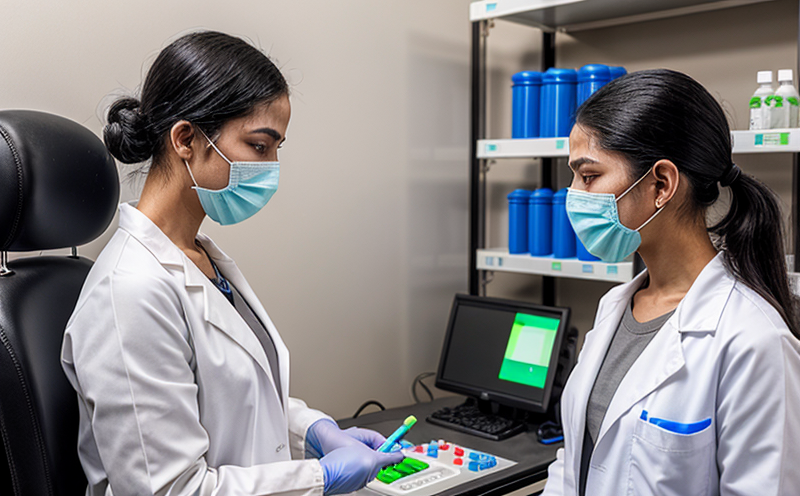In Vitro Cytogenetic Testing of Human Lymphocytes
Understanding the genetic stability and integrity of human lymphocytes is crucial in the pharmaceutical sector. In vitro cytogenetic testing, specifically targeting human lymphocytes, offers a robust method to assess potential genotoxic, carcinogenic, or mutagenic effects of new drug compounds or other agents during early-stage development.
This test involves exposing human lymphocytes to substances under controlled conditions and then examining the cells for chromosomal abnormalities. The process is designed to identify any genetic damage that might lead to undesirable outcomes such as cancer or hereditary diseases. This testing method is particularly important in pharmaceutical research because it helps ensure that new drugs are safe not only for short-term use but also for long-term administration.
The test typically involves several stages: cell culture, exposure to the substance under investigation, and finally, analysis of the cells using specialized microscopes. By comparing the pre- and post-exposure samples, researchers can determine if there has been any alteration in the chromosomes that might indicate genotoxicity or mutagenicity.
One of the key advantages of this testing method is its ability to provide early insights into potential risks associated with a compound. This allows for proactive adjustments in drug formulations and manufacturing processes, thereby enhancing product safety and compliance with regulatory standards. Moreover, it supports pharmaceutical companies in meeting stringent quality control measures set by international organizations like the International Conference on Harmonisation (ICH) and the European Medicines Agency (EMA).
The testing process is governed by rigorous protocols that ensure accuracy and reliability of results. These include standard operating procedures for cell preparation, exposure conditions, and analysis techniques. Compliance with these standards is essential to maintain credibility and trust within the industry.
Another significant benefit of in vitro cytogenetic testing lies in its ability to offer a non-invasive alternative to animal testing. By using human cells, it aligns more closely with clinical applications, potentially reducing ethical concerns often associated with animal research. This approach also supports the development of personalized medicine by providing insights into how individual patients might respond to certain treatments.
Despite its benefits, conducting such tests requires specialized knowledge and equipment. Laboratories performing these tests must have well-trained personnel who are familiar with both the biological aspects of cell culture and the technical requirements necessary for accurate analysis. Additionally, maintaining a sterile environment is critical to prevent contamination and ensure precise results.
In conclusion, in vitro cytogenetic testing of human lymphocytes plays an indispensable role in ensuring drug safety and efficacy. Its ability to detect early signs of genetic damage helps pharmaceutical companies develop safer products while adhering to high ethical standards. As our understanding of genetics continues to evolve, so too will the methodologies employed in this type of testing.
Why It Matters
The importance of genotoxicity, carcinogenicity, and mutagenicity assessments cannot be overstated, especially within the pharmaceutical industry. These tests are pivotal for ensuring that new drugs do not introduce harmful genetic changes into patients' cells. Failure to conduct thorough cytogenetic evaluations can lead to severe health risks, including increased cancer rates or hereditary diseases.
- Health Risks: Exposure to genotoxic substances can cause mutations in DNA, which may result in abnormal cell division and ultimately contribute to the development of tumors. Carcinogens are particularly dangerous as they directly increase the likelihood of developing cancer.
- Regulatory Compliance: Many countries have stringent regulations governing pharmaceutical safety, requiring rigorous testing before any new drug can be approved for market release. Non-compliance with these standards could result in product recalls and legal action.
- Patient Safety: Ensuring that all potential risks are identified early in the development process protects patients who may rely on these medications. Early detection of harmful effects allows for modifications to be made before widespread distribution, thereby safeguarding public health.
The stakes involved in ensuring drug safety are high, and it is imperative that pharmaceutical companies invest in robust testing methodologies like in vitro cytogenetic analysis. By doing so, they contribute significantly to advancing medical science while simultaneously upholding ethical standards.
Why Choose This Test
Selecting the appropriate testing method for evaluating genotoxicity is crucial given the complexity of biological systems involved. In vitro cytogenetic testing stands out due to its precision, efficiency, and relevance to human biology. Here are several compelling reasons why this test should be prioritized:
- High Precision: By focusing on specific cell types like lymphocytes, researchers can achieve more accurate assessments of genetic impacts compared to broader cellular assays.
- Efficiency: This testing approach is typically faster than in vivo studies because it eliminates the need for extended periods spent monitoring animal subjects.
- Relevance to Humans: Using human lymphocytes ensures that the results obtained are more directly applicable to human patients, enhancing the predictive value of the test.
- Ethical Considerations: As mentioned earlier, this method offers a viable alternative to animal testing, addressing ethical concerns while maintaining scientific rigor.
The combination of these factors makes in vitro cytogenetic testing an essential tool for pharmaceutical R&D. It allows companies to make informed decisions about their products early in the development pipeline, ensuring that only safe and effective treatments reach consumers.





